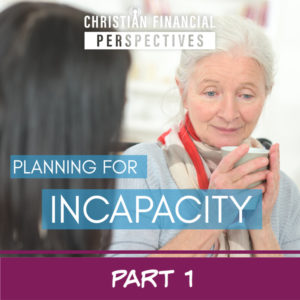Click below to listen to Episode 36 – Planning for Incapacity Part 1 of 2
Subscribe: Apple Podcasts | Google Podcasts | Spotify | Amazon Music | Stitcher | RSS | More
Planning for Incapacity Part 1 of 2
On today’s show, Bob and Mary Jo are joined with Ron First of Christian Insurance Services to discuss in a 2 part series on how to plan for incapacity. Who doesn’t want that? So listen to this episode to learn about an extremely important topic and one you should pay special attention to no matter what stage of life you are in.
When it comes to retirement, the most important thing most retirees want to protect is their independence. Health care is important but independence is even more so. When it comes to incapacity, many people have the mindset that, “It won’t happen to me.” That is just foolish thinking. Statistics clearly indicate that your odds of being incapacitated are far higher than the odds that you will die prematurely. We hope and pray it won’t happen to us, but unfortunately, the numbers tell a different story.
GUESTS: Ron First
HOSTED BY: Bob Barber, CWS® and Mary Jo Lyons, CFP®
* Ron First and Christian Insurance Services are not affiliated with Christian Financial Advisors
Mentioned In This Episode
Want to ask a question about your specific situation? Schedule a complimentary 15 minute phone call.
EPISODE TRANSCRIPT
[INTRODUCTION]
Bob: Welcome to Christian Financial Perspectives, a weekly podcast where we talk about ways to integrate your faith with your finances. This is Bob Barber.
Mary Jo: And I’m Mary Jo Lyons.
Bob: Are you ready to learn how to apply biblical wisdom to everyday financial decisions?
Mary Jo: Join us as we look at integrating your faith with your finances. If it’s your first time listening, welcome to our podcast, and if you’re a returning listener, welcome back.
[EPISODE]
Bob:
1 Timothy 5:8, “But those who won’t care for their relatives, especially those in their own household, have denied the true faith. Such people are worse than unbelievers. Boy, it’s interesting to listen to this scripture today, as we bring you our next podcast called “Planning for Incapacity”, and this is part one. Seems like the most important things retirees want to protect is their independence when it comes to retirement. Health care is important, but independence is even more important.
Mary Jo:
On today’s show, we’re going to begin our series on planning for incapacity. We’re going to start with a discussion on some of the basic tools available to help you maintain and protect your independence, and who doesn’t want that. So listen up! Today’s episode of Christian Financial Perspectives begins an extremely important topic and one you should pay special attention to no matter what stage of life you’re in.
Bob:
It seems like when people come to incapacity, and we’re going to have Ron on with us today, that they have this mindset, it’s not going to happen to me. You remember the program we did on procrastination, and that’s one of the main reasons for financial failure, and that mindset that is not going to happen to me, it’s just foolish. Just not wise because the statistics clearly indicate the odds of being incapacitated are far higher than if you’re going to die prematurely. So we really hope that this never happens to us, but today we’re go in and tell a different story about it. I’m very excited to have a good Christian brother of mine and dear friend, we see each other every day. Ron First from Christian Insurance Services. I’ve known Ron for well over 10 years now, and he brings a biblical perspective for integrating faith and protection. So Ron, welcome to the program.
Ron:
Thank you so much for having me, Bob, Mary Jo. It’s a blessing to be here truly.
Mary Jo:
Ron’s our resident expert and we are going to tap into Ron’s expertise shortly when we discuss both disability insurance and long-term care insurance as tools to help us ensure and maintain our financial independence as we age. But before we dig into that, let’s start with some more basic tools. And those tools include your estate planning documents. A health care crisis can happen to any of us at any time, and advanced planning can keep us in control and ensure that our wishes are carried out. So planning for incapacity is the best way to protect your independence. And after all, I think we all agree that’s what we all want. So the first of those tools is a will, a basic will. It controls the disposition of your assets after your death. It also names the person you have elected to be in charge of your estate, the executor of your estate, and it should be updated and kept current as your situation changes. And if you die without a will, remember that your assets will be awarded to someone by a court appointed administrator. This may or may not be the person of your choosing. We all know that families change over time. Your needs may change, and so your will should change along with that. One and done and put it on the shelf and forget it, that doesn’t work in the families of today. Wouldn’t you agree, Bob,
Bob:
I would, Mary Jo. And there’s another piece of this that’s so important is not just having your will completely current and appointing those people that are going to take care of the estate, but while you’re living, an important piece, a very important piece of this, is having a living will and a healthcare directive so that you can convey your decisions about medical treatment and what you want in case that comes along for an end of life decision. So if you can’t tell the doctors what you want, you need to put that in writing way beforehand to avoid confusion later on. Looking at details like life support, artificially administered nutrition, feeding tubes, hydration, or intravenous antibiotics, pain management. I think I got through all those long words, but those are such important things to think about in advance of needing healthcare when you don’t have the capacity to say what you want.
Mary Jo:
Oh, Bob, that is absolutely so important. My mother had all her wishes spelled out for us and she had been very explicit in what she wanted in her end of life. And after a long journey with Alzheimer’s, she was no longer able to communicate with us, but we had it in writing. Sh e’d been very clear early on. So we knew exactly what she wanted and it made us, coming behind her, able to just administer her wishes. It took the burden off of us. So I really encourage everyone to have that in place as a gift to your loved ones. The next tools we want to look at are power of attorneys. There is both a medical power of attorney and a durable power of attorney, and these are two different documents. The medical power of attorney appoints the person you choose to make decisions about your healthcare in case you’re not able to do so. And it also can include your religious and moral beliefs. And then a durable power of attorney appoints a trusted family member or friend to make financial decisions in the event you’ve become incapacitated.
Bob:
We’ve gone over the will, the living will, and the healthcare directive, the medical power of attorney, the durable power of attorney, and then this last document out of hospital do not resuscitate. What this form does is it instructs the doctors and all those that are taking care of you in the healthcare profession to forego resuscitation attempts and permit you to die a natural death so you’re not kept alive by a bunch of machines.
Mary Jo:
And it allows you peace and dignity that you choose. So important. I wanted to share a story, and I know Bob, you can relate to this having had three daughters, but every person over the age of 18 should have at a minimum a will and both power of attorneys in place. So, let me kind of paint this scenario for you, if you’re a parent and you have a college aged child over the age of 18, but who are still in college and under your household and your care and your influence, and let’s just say they’re still single and they don’t have a spouse in the picture, but you may not be able to make healthcare decisions or access information about their financial accounts on their behalf in case there’s a medical crisis. So think about that. Your 20 year old son or daughter has a skiing accident while they’re on spring break, and they require emergency medical attention. And even as their parent, the medical staff is not legally obligated to provide you any medical information on their condition. They are a legal adult. And if you don’t have that power of attorney and advanced healthcare directive, you really have no legal standing to make medical decisions or access medical information or take care of their bills while they’re incapacitated. So you need that for both medical reasons as well as financial reasons. Does that make sense? And what do you think of that, Bob?
Bob:
Oh, it absolutely does. And as I think about my own daughters, we need that in place because if something did happen to one of them and like you said, they’re over 18 now, all of them. Actually, the youngest is 25. But if something did happen to them, we don’t have that document in place. They may not talk to us.
Mary Jo:
Let’s look at even another situation. Let’s just say you’re a single man and you buy a home. The deed to the home is in your name. You get married and your new spouse’s name is not on the title of the home. It still remains in your name. 25 years later, you die prematurely. Your home does not necessarily pass to your spouse and is not considered community property. It’s not titled joint tenants with rights of survivorship.
Bob:
Most people don’t think about this.
Mary Jo:
It’s the titling of the assets that are so important. So what you’re saying here is that if I owned my home before I got married and then I get married and I don’t put the home in both of our names, that if something happened to me in either my first or my second marriage, but I’m thinking of a second marriage, for some reason. Thinking that maybe your first wife passed away or her husband and you get remarried and you want to take care of your spouse, but if you owned the property beforehand and you didn’t put it in both your names, and if you passed away prematurely, your spouse would not necessarily get the property. Is that what you’re saying?
Mary Jo:
That very well could happen. And we want to pause here and just say, Bob and I are not legal experts. So we want to encourage you to consult your own legal situation and rules vary by state. Some states are community property states and some states aren’t. So you want to look at this very closely. You have second and third marriages. You have property that’s held outside of joint tenant titlement. So all of this kind of muddies the water, if you will, but what you really want to pay attention to are who your legal heirs are. Instead of it being your spouse, it could be your parents. Then, your siblings might get a higher ranking than your spouse. So you want to investigate all that. That’s really what we’re saying.
Bob:
Well, when you think about planning for incapacity, this is something that most people don’t think about.
Mary Jo:
Right. And there are some other rules where your current spouse may only inherit a third share of home or land, and the other two thirds of the home or land could go to your parents or your children who have a different agenda. What if they’re not a big fan of the new spouse, so they’re not motivated to protect her or him and make sure that they’re able to stay there for their lives. So without a will documenting your wishes, your assets will pass according to state law. Texas is a community property state, so much will be determined by when the assets were purchased.
Ron:
Let me chime in here. This is very, very important. There’s a scripture. Again, I’m very, very bad at citations, but it says that we are to know the condition of our flocks. Bob, I know you know this scripture.` You’ve quoted it many times. I think this is a great opportunity and people need to be aware that they’re constantly looking at your assets. Review them constantly so there’s no doubt about who’s getting what, and I think this is all part of making sure that when you go to be with the Lord, everything is taken care of for your family and you’re being a wise steward.
Mary Jo:
What is it that they used to say in school, without prior planning, you get poor results. Excuse my French.
Bob:
Yeah. Okay. Yeah. I meet with people all the time that are in a second marriage because the first spouse passed away. They’ve been in this second marriage for maybe 15 or 20 years, and they want to make sure that if something happens to them that their spouse is taken care of. And in this case, if you’ve not structured it correctly and you’ve procrastinated about this, it may not happen.
Mary Jo:
This kind of brings up another good point. People ask us all the time if they can use free online services to create all these legal documents. And my answer is yes, you can, but we don’t encourage this. We feel that consulting an attorney who will understand state law, understands your unique situation, and makes sure that the language is correct so that your wishes are spelled out is so important. What do you think about that?
Bob:
I absolutely do. And maybe you’ve heard me talk about this in the past when we’ve talked about estate planning. There’s what’s called a QTIP, like cleaning out your ear, but it’s called a Q-tip. It means qualified trust, and what that trust does is it makes sure that that second spouse is taken care of and then whatever assets are left after she’s gone, it goes back to the original children of each one. So this really applies in that second marriage where you’ve lost your first spouse.
Mary Jo:
And there are many different kinds of trusts besides the QTIP trust. All of those are important to accomplish various goals, but they’re definitely beyond the scope of today’s show.
Bob:
Well, as we’ve been talking about this planning for incapacity, we’re going to get in with our guest now because we had him come on thinking about ways to protect things like your income and long-term care, because I know when I’m meeting with clients everyday, they’re concerned about long-term care expenses. So, let’s start looking at those two aspects of planning for incapacity.
Mary Jo:
Bob, as we’ve recently been talking about our annual review meeting process and exploring ways to improve this, one of the questions we asked clients we’re working with, especially working professionals, is what have you done to protect your income? And it’s interesting how many people never give a thought to becoming incapacitated, but it’s their human capital or their ability to earn money that’s their most important asset.
Bob:
Okay. Ron, I want you to chime in here because this is why we have you as a guest on our program today, speaking into this disability and the importance of it.
Ron:
Yeah. Disability is defined as being unable to perform your normal job duties. Most people think that social security disability, SSDI or workers’ compensation, is sufficient to protect their ability to earn income, but it’s really not. In fact, from 2006 to 2015, only 34% of social security disability insurance claimants had their applications approved. That’s significant. 23% at the initial application stage qualified the remainder after a reconsideration or appeals process. That’s because the social security disability insurance guidelines say you have to be unable to work as well as perform basic life skills, almost nearing the ADL or activities of daily living. It takes three to five months for an application to be approved. And the backlog is hellacious. In 2017, the appeal cases were more than 1 million. That’s incredible. So, that may equate to 18 months of lost income. What do you do?
Bob:
Ron, I think about this. Yeah. What do you do unless you have enormous cash reserves? What do you do?
Mary Jo:
Gentlemen, there’s a statistic that I think is important to share with our listeners. According to a study, 30% of all Americans between the ages of 35 and 65 suffered a disability lasting longer than 90 days. One of the key things we want to drive home is that the risk of disability is real.
Bob:
Yeah. And Mary Jo, I don’t have the stats in my head right now, but you hear that most people have less than a couple thousand dollars in their savings account for a major catastrophe like this. It adds insult to injury.
Mary Jo:
They’re unprepared.
Ron:
Yeah. The average social security disability insurance benefits as of January 2018, believe it or not, was $1,197 a month. That equates to $14,000 annually, barely enough to meet the poverty guidelines. For a single person, it’s $12,000 and the household is $16,000. It’s incredible. People don’t prepare.
Bob:
They don’t prepare and you lose your job. What do you do, Ron?
Ron:
Well, that’s where having income protection – it’s probably a better term than disability protection – that’s where it is essential to have.
Mary Jo:
And where does workers’ comp play into this?
Ron:
Well, workman’s comp only provides for benefits if you’re disabled or become ill at the workplace. It has to be work-related. In 2016, only 1% of American workers missed work because of an occupational illness or injury – 1%.
Bob:
So if you fall off the roof of your house and you’re injured for six months or you’re in a car accident, you’re not going to be covered.
Ron:
Exactly.
Mary Jo:
I have this image in my mind. So, if you fall off the roof of the house putting up Christmas lights, for example. How many people do that?
Bob:
You know me. I always look at it from the perspective of what could I pay somebody to do that versus what would the emergency room bill be?
Mary Jo:
Exactly.
Ron:
Well, Bob brings up a very interesting point. That’s what insurance is all about. It’s actually paying an insurance company to defer or accept your risk. That totally explains what insurance is about, transferring risk.
Mary Jo:
There’s two different kinds of disability. There’s group disability and individual disability. Can you talk to us a little bit about that?
Ron:
Sure. Let’s start with the group disability. Many employers will offer group disability at the workplace. And typically, you have to get in during what’s called the open enrollment period. Group disability insurance is based on a master policy and because of that, you have large numbers depending upon the size of the company you’re working for. And if it’s a private employer or public governmental employer, because there are different laws that are involved. But if you’re blessed to be a part of a group and a big group, and the employer has a master plan or a master disability policy, rates can be extremely low, which is fantastic. You can’t get that in an individual plan. Rates are significantly higher, but it’s important to remember that group disability doesn’t mean that’s the end of protecting your income because most plans will allow for 60% of your gross salary. Take taxes after that and you may be down to 55-50% of your salary. What do you do after that? Who could live on 50% of their salary?
Mary Jo:
It’s something, but it’s certainly not enough. And there’s a difference between long-term and short-term disability.
Ron:
Correct? Mary Jo, short term is considered anything less than one year, three months, six months versus long-term, which is anything longer than one year. And typically people for longterm will look at one, three, five. The best plan is going to be up to 65, or even 67, for that matter.
Bob:
So, if there’s a short-term disability policy, Ron, does that mean it doesn’t have a deductible with it? Because I know with disability, a deductible is not considered necessarily a dollar amount, but it’s considered days, right? You look at deduct-ability as days. How long have you been disabled before it kicks in?
Ron:
Yeah, we don’t typically talk about the deductibles per se. That’s more for property. When it comes to disability, we’re looking at what’s called the elimination period, how long it will take before your benefits actually kick in and stop paying.
Mary Jo:
I spent a lot of years in the corporate world and one thing that people need to be aware of is the employer typically provides short term disability as a group benefit, and you don’t have to pay for that. It’s been designed to provide maternity leave for women for the majority of the time or extended sick leave. But then, when it comes to longer term disability, they don’t provide that. So it’s up to the employee to fund that or pay for that benefit if they choose to. Isn’t that your experience, Ron?
Ron:
Absolutely. Yeah. And that’s another advantage of the group plan. It will provide for time for maternity, whereas an individual policy does not provide for maternity benefits.
Bob:
So Ron, if you buy a long-term policy, it’s over a year, so you can buy that like in a one-year increment, a two year, three year, five year, or even all the way to age 65 or 67, depending on when social security starts.
Ron:
Absolutely. That’s called your benefit period. And people vary depending upon their needs. Of course the longer your benefit period is, the more risk is being transferred to the insurance company and they charge higher premiums for that. Oftentimes, I deal with a lot of people that take care of one half of their income protection, they’ll buy life insurance, not realizing that you’re typically going to be disabled before you pass. And that’s why disability insurance is that much more expensive is because there’s a greater propensity for you to be disabled or ill rather than passing away during your peak earning years.
Bob:
What are those stats? We all know we’re going to die, but what are the stats of becoming disabled for, say, somebody that’s 30 years old becoming disabled before they’re 65. Do you have those stats?
Ron:
I do. Actually, for a 20 year old today, typically one in four 20 year olds today, will become disabled whether by illness or by an accident outside of the workplace, within their given work span to age 65 or retirement. That’s substantial. That’s 25%.
Mary Jo:
Another thing that y’all have been talking that came to mind is how important the portability of disability insurance is. So if it’s an employer based plan or a group plan, it’s not portable. It won’t go with you and travel if you change jobs. Can you talk a little bit about why it’s important for people to consider an individual, long-term disability, as opposed to a group long-term disability for that reason.
Ron:
Excellent point. There is no portability in a disability policy that you get from your employer. So, that’s significant because if you leave your job, you still want to have disability insurance. And what happens if you develop diabetes or any type of debilitating disease where you could still work, but it makes you uninsurable on an individual policy.
Mary Jo:
So the older we get, the higher that risk.
Bob:
Absolutely. That’s why insurance costs more as you get older. Your mortality increases, as well as your morbidity. And remember, there’s two different ways that underwriters look at disability insurance. Disability is predicated on morbidity, your ability to work. The number one cause of disability is not an accident. The number one cause of disability is going to be neuromuscular or musculoskeletal issues. And then you have cancer, heart disease, diabetes. These come in second and third, et cetera.
Mary Jo:
So more health related issues.
Bob:
I want to chime in here because most of our listeners know, and of course you ought to know, that just last year, Rachael got cancer, which is my wife for those of you that don’t know. And we have disability coverage cause Rachael works for Christian Financial Advisors as a consultant. And we were able to collect disability while she was getting all of her cancer treatment. So, I mean, we were covered so well. We were covered by the disability, then we were covered by our group health plan. And while this cost probably over a hundred thousand, we saw some of the bills. We were not out of pocket at all on this entire illness, and it sure took away the pressure.
Mary Jo:
Ron, can you talk a little bit about the individual disability policies and the points and the features that are important to consider? I think we want to make sure that we run through those while time allows.
Ron:
Oh, definitely. And let me add this. This is very, very important, and it’s going to become a surprise to many people. Just because you have group disability insurance for your employer doesn’t mean you don’t need an individual plan because we already know that 60% is the maximum benefit for the most part. If you work for a private employer, you can supplement that plan by having an individual plan. Remember, your group disability plan at work is going to be very inexpensive. So, it behooves you to make up that 40% differential, the distance between what your group plan will provide for and what you can do. You can supplement that on your own with a parallel individual plan.
Bob:
Okay, Ron, I’ve got to ask here, because I know someone’s listening and thinking, how much is this going to cost? And of course you can say, how much is it not going to cost, if that’s the right way to say it? If you don’t get it when you’re disabled, it’s going to hurt you a lot worse. Is this cost prohibitive for some people to get the additional disability coverage, or can most people afford that cost?
Ron:
Yeah. That’s a great question, Bob and comparatively speaking to like term life or permanent disability insurance is significantly more expensive because the propensity of you becoming disabled is that much greater, but it’s so essential.
Mary Jo:
Especially if you’re the primary breadwinner of the family and you’ve got a lot of people that are dependent on your income. I think it becomes even more critical.
Ron:
Absolutely. Mary Jo, I wanted to get back to the individual disability policy. Can we talk a little about the ins and outs of that? Remember that the definition of disability is being unable to perform your regular job duties. So it’s very important that when you’re looking at an individual policy to have certain endorsements, commonly known as riders, built into your policy. The characteristics of building an individual disability policy, not all disability policies are created equal. The base policy itself, the language of the policies, differ from one company to another. It’s very important to make sure you’re looking at the language and what lay person understands the language of a disability policy? They don’t. Most salespeople don’t know it.
Mary Jo:
So one of the things that resonates with me that I’ve heard so often about disability policies is you want to make sure it specifies that it will replace, or require you to be able to perform, your own occupation or any occupation. Can you talk about that a little bit?
Ron:
Great point. Let’s say that I’m working with a doctor, or giving some advice to a doc that’s looking for disability insurance. That doctor wants what’s called an “own occ” or an “own occupation policy”, meaning that if doctor becomes incapacitated and disabled and cannot work. That doctor doesn’t want a policy that will say, okay, well you can’t perform surgery. This doctor happens to be an orthopedic surgeon. Some insurance policies would say, okay, you can’t work as a surgeon, but you can work at a desk. So, we’re going to pay you a partial benefit. You can do the math on that.
Ron:
They may say that he’s eligible to go teach medical school, for example. Exactly. Absolutely. Great point. So you want to make sure that you have that “own occ” endorsement or rider built into your policy.
Bob:
Ron, I’ve got a question here because I’m listening to all of these things you’ve gotta be thinking about, and you really know disability insurance. Do most agents out there understand disability the way you do, or have you just made a real strong effort to understand disability?
Ron:
Well, it goes back to a holistic perspective on financial planning and I approach my practice, Christian Insurance Services, we approach it from a holistic perspective. Many salespeople approach it from selling a policy and they’re not, they don’t know the rest of the story. What does the rest of the financial aspect of that family looking like? It all plays into it. That’s why I urge my clients not to purchase any type of insurance product based upon price, but on wisdom and make sure you’re getting counseled. There is counsel in the wisdom of many. So you need to know how this part of the puzzle, disability, fits into the whole financial house. So, some things that you want to look at when considering, or constructing, an individual disability policy is you want to make sure you have a COLA provision. That’s the cost of living adjustment. As inflation goes up, your earning power is lowered. You want to make sure you have at least a 3% built into that. Any disability policy cannot be canceled or non-renewed outside of you not paying your premium. So that is not an issue, but it’s very important to consider your waiting period or elimination period. Again, your emergency fund will dictate how much risk you were able to take. If you have six months of reserve capital, then you can go further out in elimination period. And most critical, I would say, is you have to make sure that your policy is structured with guaranteed ability to make purchases in the future without showing uninsurability, because life happens. You’re fine today, but you develop diabetes 10 years later. You want to make sure you can buy more protection without showing uninsurability because the underwriter may say, sorry, we’re not giving you any more. You have diabetes. That’s a critical rider that has to be in that policy.
Mary Jo:
You think about how many executives are earning modestly in their forties, but as they go into their fifties and sixties, their salaries and their total compensation packages increase drastically. So if they haven’t upped the amount of their coverage, they could certainly have a major shortfall.
Bob:
One last point I was thinking about, and I need to ask you, Ron, can you get disability coverage past 65? You cannot, may. You may be able to get it to age 67, but it will be cost prohibitive and not recommended for getting it for two years of spread between 65 and 67, all intents and purposes. Bob, the answer is no,
Mary Jo:
There’s a couple of other types of disability contracts that we want to run through for our listeners. There’s business overhead expense, which is available to business owners. There’s also key person disability, and this can provide funding of temporary placement or training of a successor if the owner of the firm were to be incapacitated. There’s also a disability buyout, which provides income to fund a buy-sell agreement that can be triggered by a total disability of a shareholder or owner. And those payouts can either be made in a lump sum, an installment, or a combination of the two. I know a lot of our listeners are business owners, so these are some things that they may want to look into. Ron, before we wrap up, is there anything else our listeners should be aware of when considering types of disability contracts?
Ron:
Yes. So the disability policy, as you’re stating, is a tool that could be used for different structuring in your business. Just again, make sure that you have that guaranteed ability to purchase more benefits without having to show insurability for that. Critical.
Bob:
So Ron, as we end the program, a couple more things I want to ask is what are some things you should consider about the company that’s actually going to be insuring you, the insurance company itself?
Ron:
Yeah. There are that many disability insurance companies out there compared to the life insurance. You basically need to make sure that the company is at least rated A or A+= by AM Best. And they’re going to offer the type of riders or endorsements that we were talking about, cost of living, guaranteed insurability, those kinds of things. But for the most part, there aren’t that many disability companies out there selling insurance.
Mary Jo:
Ron, we want to thank you for joining us today. Our guest has been Ron First with Christian Insurance Services. Join us next time as we discuss planning for the cost of long-term care or longevity. We’ll talk about that as another great tool to help you maintain your independence as you age.
Bob:
And one last thing is make sure that all of your loved ones know about your coverages in advance before an emergency happens.
[DISCLOSURES]
Comments from today’s show are for informational purposes only and not to be considered investment advice or recommendations to buy or sell any company that may have been mentioned or discussed. The opinions expressed are solely those of the hosts, Bob Barber and Mary Jo Lyons. Bob and Mary Jo do not provide tax advice and encourage you to seek guidance from a tax professional. Investment advisory services offered through Christian Investment Advisors Inc. DBA Christian Financial Advisors, a registered investment advisor. This show is designed to provide accurate and authoritative information on the subjects covered. It is not however intended to provide specific legal, tax, or other professional advice. Estate planning can involve a complex web of tax rules and regulations. Tax laws surrounding estate planning concepts are subject to change. Please consult an estate planning attorney prior to making any financial decisions.













